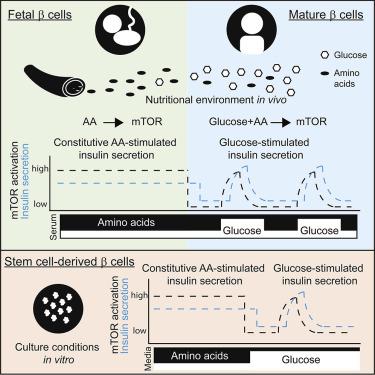当前位置:
X-MOL 学术
›
Cell Metab.
›
论文详情
Our official English website, www.x-mol.net, welcomes your feedback! (Note: you will need to create a separate account there.)
A Nutrient-Sensing Transition at Birth Triggers Glucose-Responsive Insulin Secretion.
Cell Metabolism ( IF 29.0 ) Pub Date : 2020-05-05 , DOI: 10.1016/j.cmet.2020.04.004 Aharon Helman 1 , Andrew L Cangelosi 2 , Jeffrey C Davis 1 , Quan Pham 1 , Arielle Rothman 1 , Aubrey L Faust 1 , Juerg R Straubhaar 1 , David M Sabatini 2 , Douglas A Melton 3
Cell Metabolism ( IF 29.0 ) Pub Date : 2020-05-05 , DOI: 10.1016/j.cmet.2020.04.004 Aharon Helman 1 , Andrew L Cangelosi 2 , Jeffrey C Davis 1 , Quan Pham 1 , Arielle Rothman 1 , Aubrey L Faust 1 , Juerg R Straubhaar 1 , David M Sabatini 2 , Douglas A Melton 3
Affiliation

|
A drastic transition at birth, from constant maternal nutrient supply in utero to intermittent postnatal feeding, requires changes in the metabolic system of the neonate. Despite their central role in metabolic homeostasis, little is known about how pancreatic β cells adjust to the new nutritional challenge. Here, we find that after birth β cell function shifts from amino acid- to glucose-stimulated insulin secretion in correlation with the change in the nutritional environment. This adaptation is mediated by a transition in nutrient sensitivity of the mTORC1 pathway, which leads to intermittent mTORC1 activity. Disrupting nutrient sensitivity of mTORC1 in mature β cells reverts insulin secretion to a functionally immature state. Finally, manipulating nutrient sensitivity of mTORC1 in stem cell-derived β cells in vitro strongly enhances their glucose-responsive insulin secretion. These results reveal a mechanism by which nutrients regulate β cell function, thereby enabling a metabolic adaptation for the newborn.
中文翻译:

出生时的营养感知转变触发葡萄糖反应性胰岛素分泌。
出生时从持续的母体营养供应到产后间歇性喂养的剧烈转变需要新生儿的代谢系统发生变化。尽管它们在代谢稳态中发挥着核心作用,但人们对胰腺 β 细胞如何适应新的营养挑战知之甚少。在这里,我们发现出生后 β 细胞功能从氨基酸刺激转变为葡萄糖刺激的胰岛素分泌,这与营养环境的变化有关。这种适应是由 mTORC1 途径的营养敏感性转变介导的,这导致间歇性 mTORC1 活性。破坏成熟 β 细胞中 mTORC1 的营养敏感性会使胰岛素分泌恢复到功能不成熟的状态。最后,在体外操纵干细胞衍生的 β 细胞中 mTORC1 的营养敏感性强烈增强了它们的葡萄糖反应性胰岛素分泌。这些结果揭示了营养物质调节 β 细胞功能的机制,从而使新生儿的代谢适应成为可能。
更新日期:2020-05-05
中文翻译:

出生时的营养感知转变触发葡萄糖反应性胰岛素分泌。
出生时从持续的母体营养供应到产后间歇性喂养的剧烈转变需要新生儿的代谢系统发生变化。尽管它们在代谢稳态中发挥着核心作用,但人们对胰腺 β 细胞如何适应新的营养挑战知之甚少。在这里,我们发现出生后 β 细胞功能从氨基酸刺激转变为葡萄糖刺激的胰岛素分泌,这与营养环境的变化有关。这种适应是由 mTORC1 途径的营养敏感性转变介导的,这导致间歇性 mTORC1 活性。破坏成熟 β 细胞中 mTORC1 的营养敏感性会使胰岛素分泌恢复到功能不成熟的状态。最后,在体外操纵干细胞衍生的 β 细胞中 mTORC1 的营养敏感性强烈增强了它们的葡萄糖反应性胰岛素分泌。这些结果揭示了营养物质调节 β 细胞功能的机制,从而使新生儿的代谢适应成为可能。


























 京公网安备 11010802027423号
京公网安备 11010802027423号